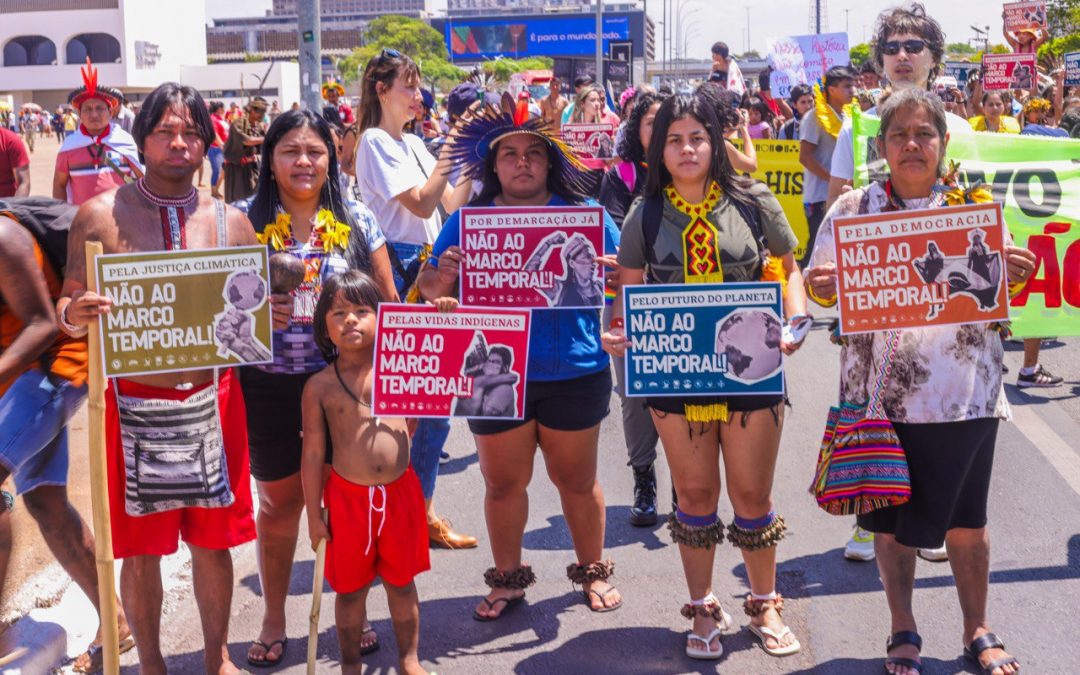Foto: Kamikia Kisedje / Apib
Minister from the Federal Supreme Court (STF) Dias Toffoli voted against the Time Frame thesis on the demarcation process of Indigenous Lands in a session held this afternoon (20/09). The vote now stands at five votes against the ruralist thesis and two votes in favor of the anti-indigenous proposal. The trial was interrupted due to lack of time and should resume tomorrow, September 21.
“Minister Toffoli’s vote is against the Time Frame thesis (Marco Temporal), but it contains dangerous points against indigenous peoples. We have to remain vigilant and continue mobilizing. It’s important to remember that the Supreme Court has not yet concluded its trial and the votes are still in dispute. Let’s hope that the next votes follow the rapporteur’s vote [Edson Fachin], which is what we are defending. A vote against the Time Frame, but also against prior compensation and that guarantees the original rights of indigenous peoples,” said Dinamam Tuxá, executive coordinator of Apib, after the session ended.
Maurício Terena, Apib’s legal coordinator, added: “At the last moment, the minister brought up an issue that really concerns us as an indigenous movement. The minister precepts a thesis on economic exploitation on indigenous lands. We understand that this is not the time to have this debate and the way he did it, to some extent, makes the exclusive usufruct of indigenous peoples more flexible.
The trial on the Time Frame thesis had already been suspended on August 31st. Since then, indigenous leaders from different peoples and territories have been mobilizing in Brasilia, where they are camped at the Indigenous Peoples Memorial.
So far, Ministers Edson Fachin, Alexandre de Moraes, Cristiano Zanin, Luís Roberto Barroso and Dias Toffoli have voted against the Time Frame thesis. André Mendonça and Nunes Marques voted in favor of the atin-indigenous thesis. Minister Cármen Lúcia, Rosa Weber, Luiz Fux and Gilmar Mendes have yet to vote.
The Time Frame thesis is a political thesis that states that indigenous peoples would only have the land right recognition (demarcation of lands) if they were in possession of them on October 5, 1988, the date of the promulgation of the Federal Constitution. Apib points out that the thesis is unconstitutional and anti-indigenous, as it violates the peoples’ original right to their ancestral territory – provided for in the Constitution itself – and ignores the violence, especially during the military dictatorship, and the state control to which the peoples were subjected until 1988.
At the STF, the Time Frame thesis deals, on the merits, with a possessory action (Extraordinary Appeal No. 1.017.365) involving the Xokleng Ibirama Laklaño Indigenous Land, of the Xokleng, Kaingang and Guarani people, and the state of Santa Catarina. With a status of general repercussion, the decision taken in this case will serve as a guideline for all indigenous land demarcation processes in the country. As Minister Luís Roberto Barroso said, “The constitution is very clear, there is no ownership over lands traditionally belonging to indigenous communities. This is the solution to this case.”
Senate adjourned
A lack of dialog and respect marked the session of the Senate at the Constitution and Justice Committee today (20/09). Indigenous leaders were prevented from entering and the committee rejected a request for a public hearing to debate Bill 2903, which aims to turn the Time Frame thesis into law and legalize crimes committed against indigenous peoples. The vote was postponed until September 27 after the senators collectively asked for a review.
For Apib, the clash between the legislature and the judiciary is a direct confron by politicians who want to impose their economic interests on indigenous lands over indigenous lives and those of the Brazilian people.
About Apib
A Articulação dos Povos Indígenas do Brasil (Apib) é uma instância de referência nacional do movimento indígena no Brasil, criada de baixo pra cima. Ela aglutina sete organizações regionais indígenas (Apoinme, ArpinSudeste, ArpinSul, Aty Guasu, Conselho Terena, Coaib e Comissão Guarani Yvyrupa) e nasceu com o propósito de fortalecer a união de nossos povos, a articulação entre as diferentes regiões e organizações indígenas do país, além de mobilizar os povos e organizações indígenas contra as ameaças e agressões aos direitos indígenas
The Articulation of Indigenous Peoples of Brazil (Apib) is a national coalition reference for the indigenous movement in Brazil, created from the bottom up. It brings together all seven regional indigenous organizations (Apoinme, ArpinSudeste, ArpinSul, Aty Guasu, Terena Council, Coaib and Guarani Yvyrupa Commission) and was born with the aim of strengthening the unity of our peoples, the joint action between the different regions and indigenous organizations in the country, as well as mobilizing indigenous peoples and organizations against threats and attacks on indigenous rights.
Find out more about the time frame: https://apiboficial.org/marco-temporal/?lang=en
For more information and to arrange interviews, please contact the press service:
E-mail: [email protected]
Communications Coordinator – Samela Sateré Mawé – +55 (92) 98285 5077
+55 (65) 99686 6289 / +55 (21) 96665 5518 / +55 (92) 99430-3762

